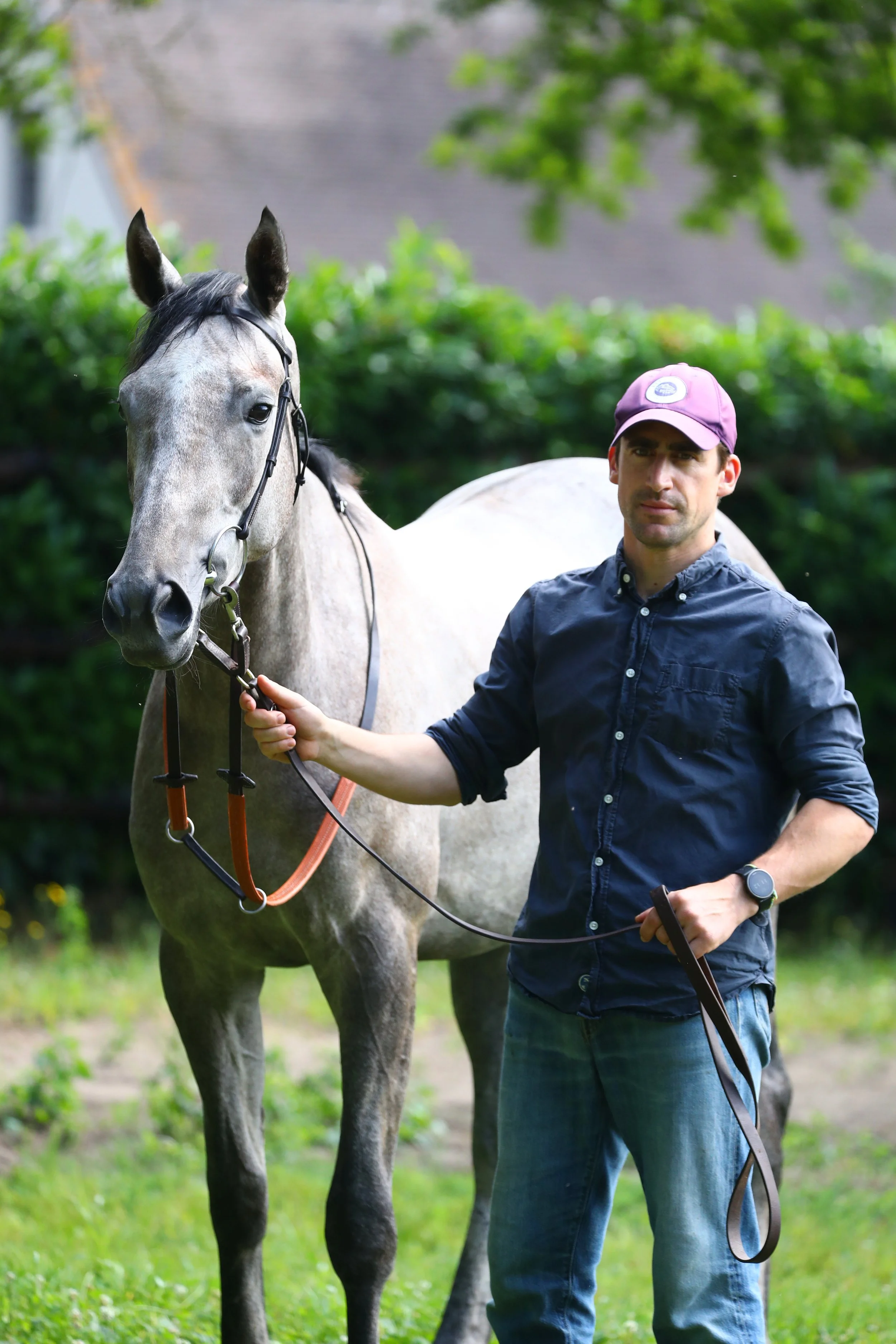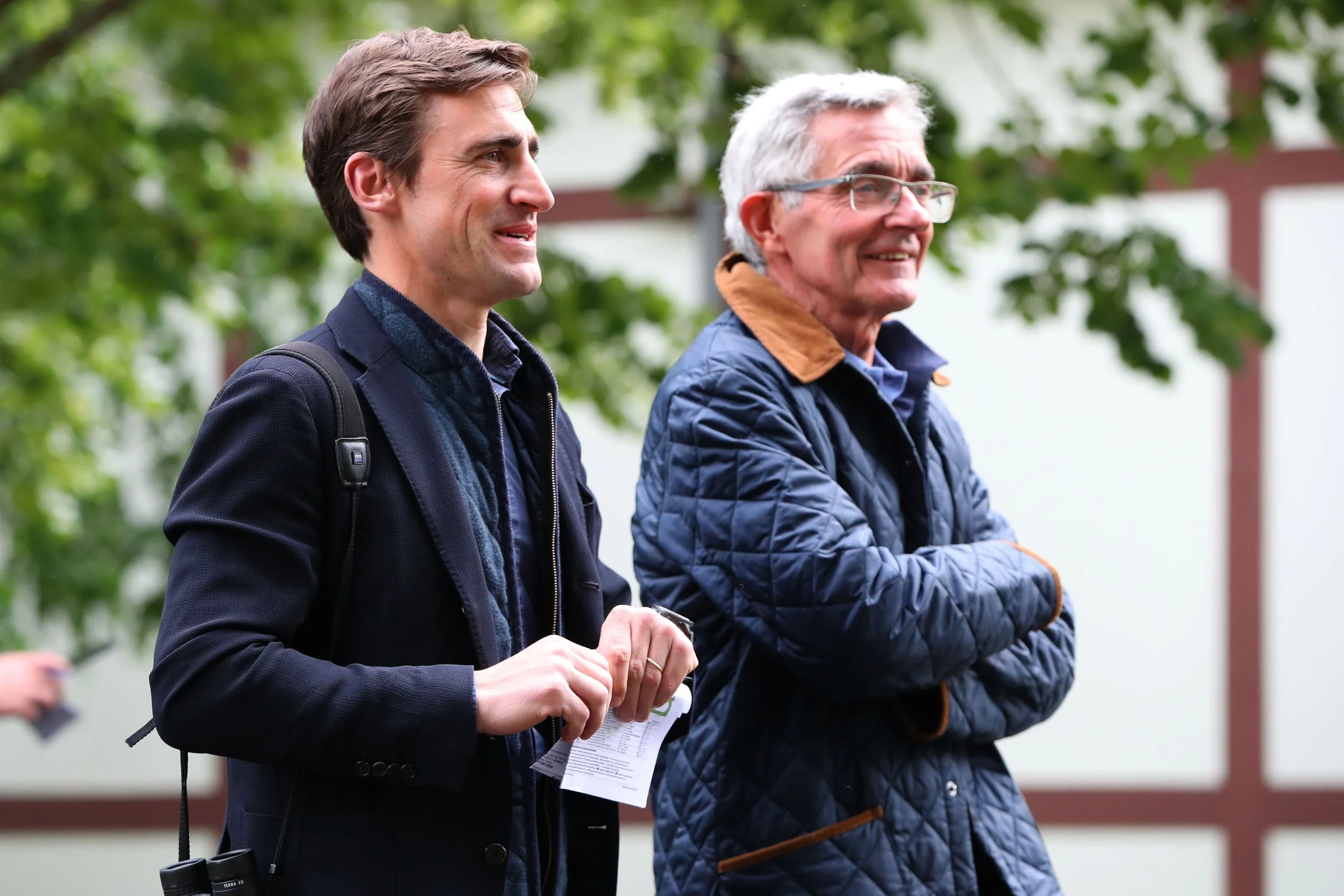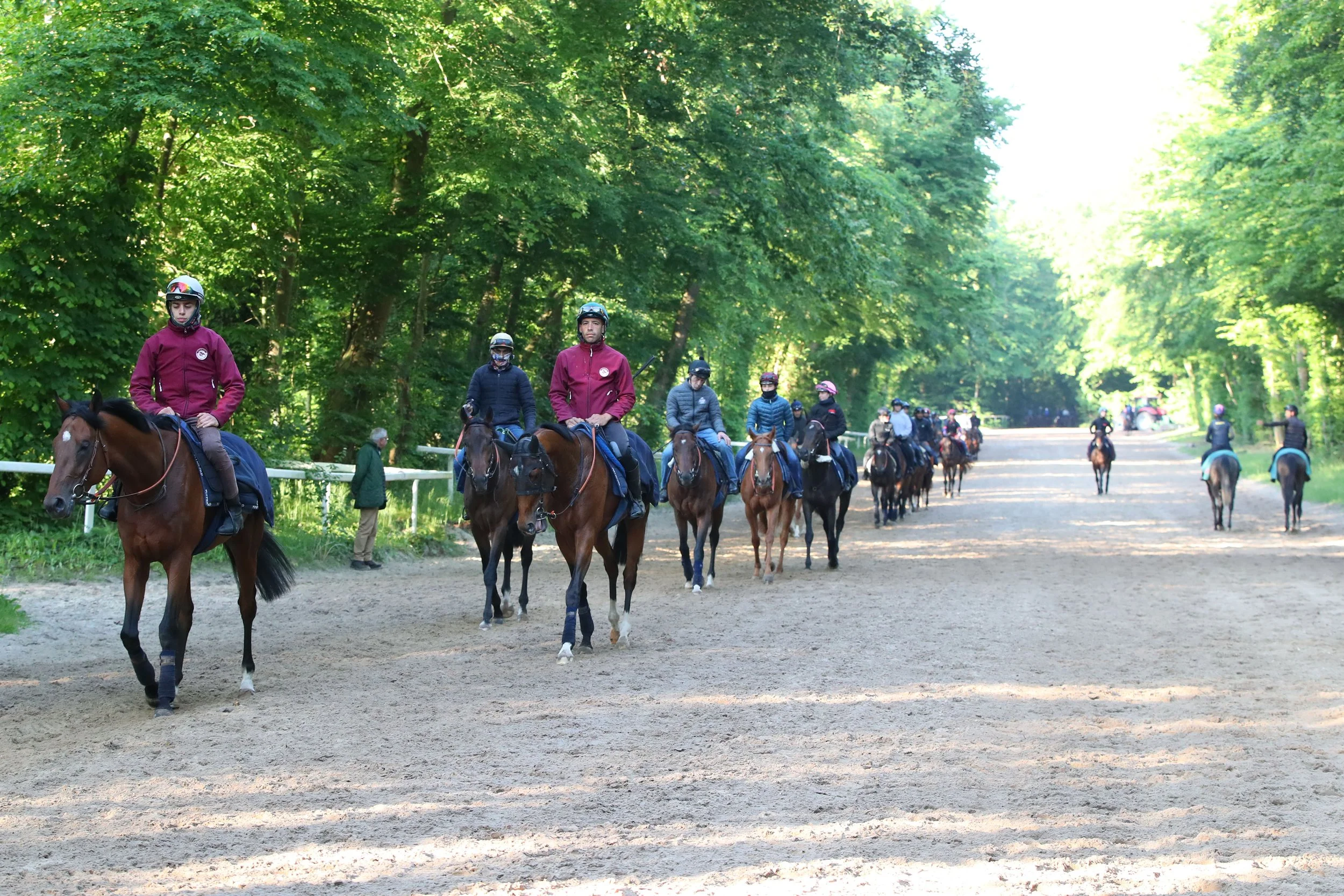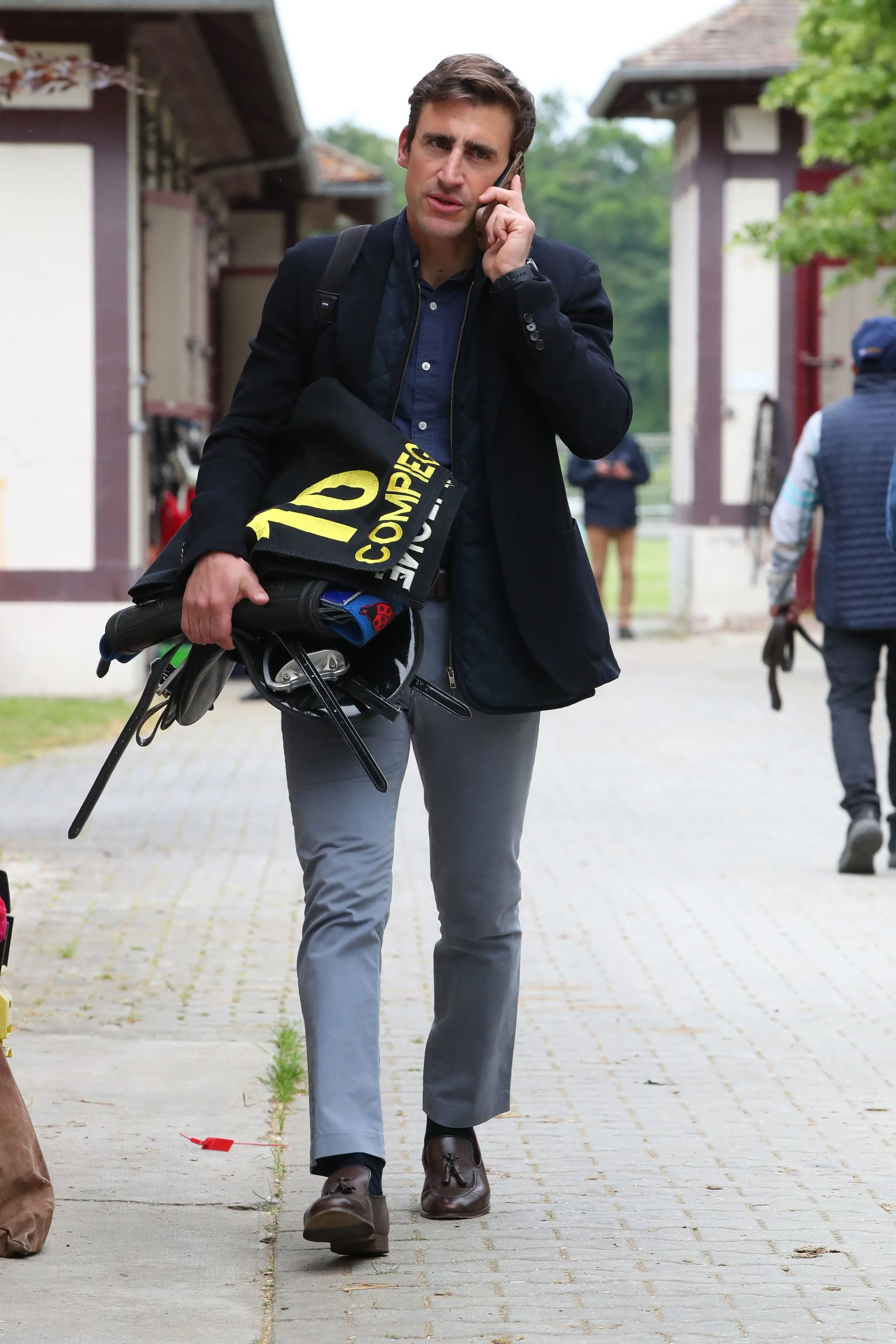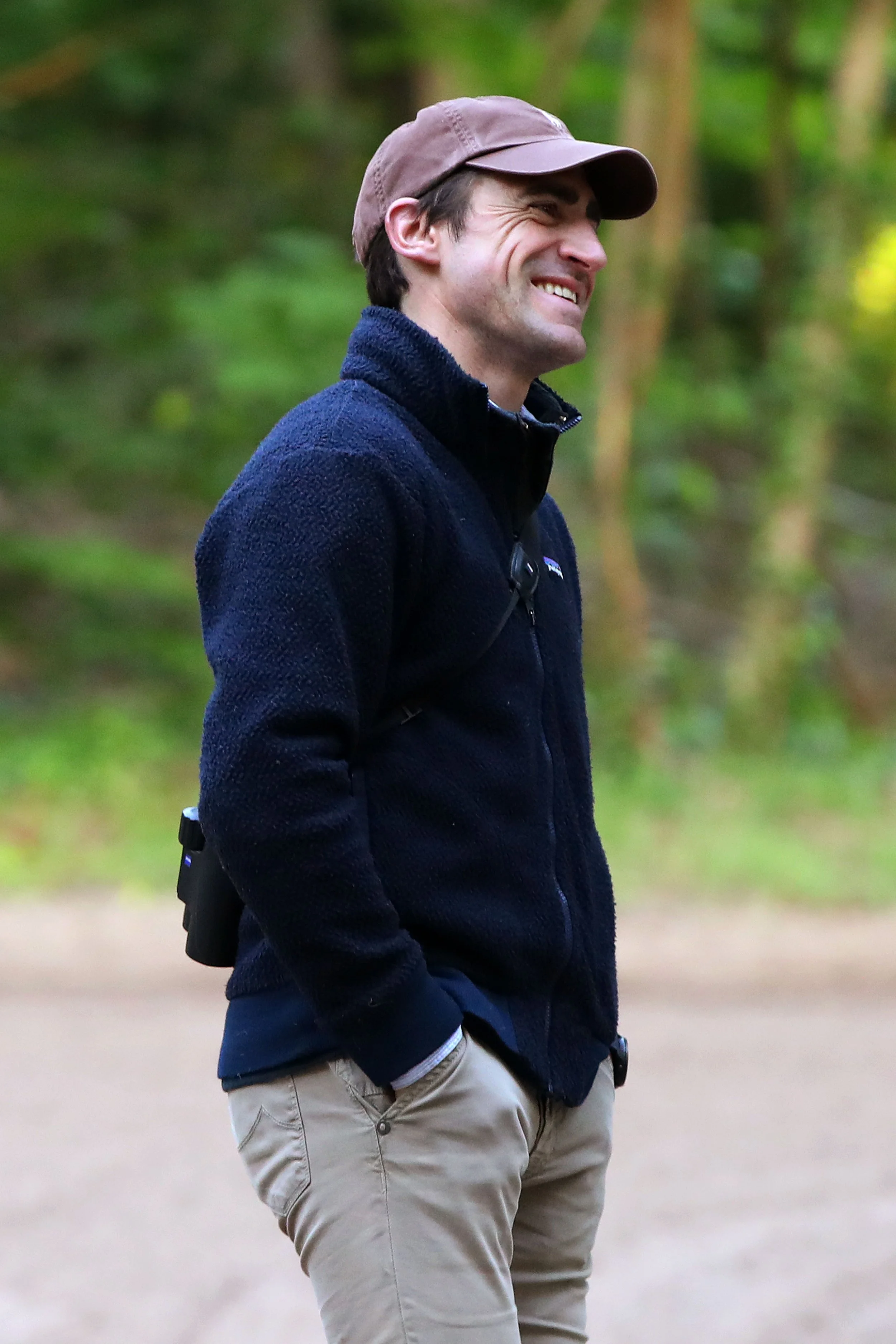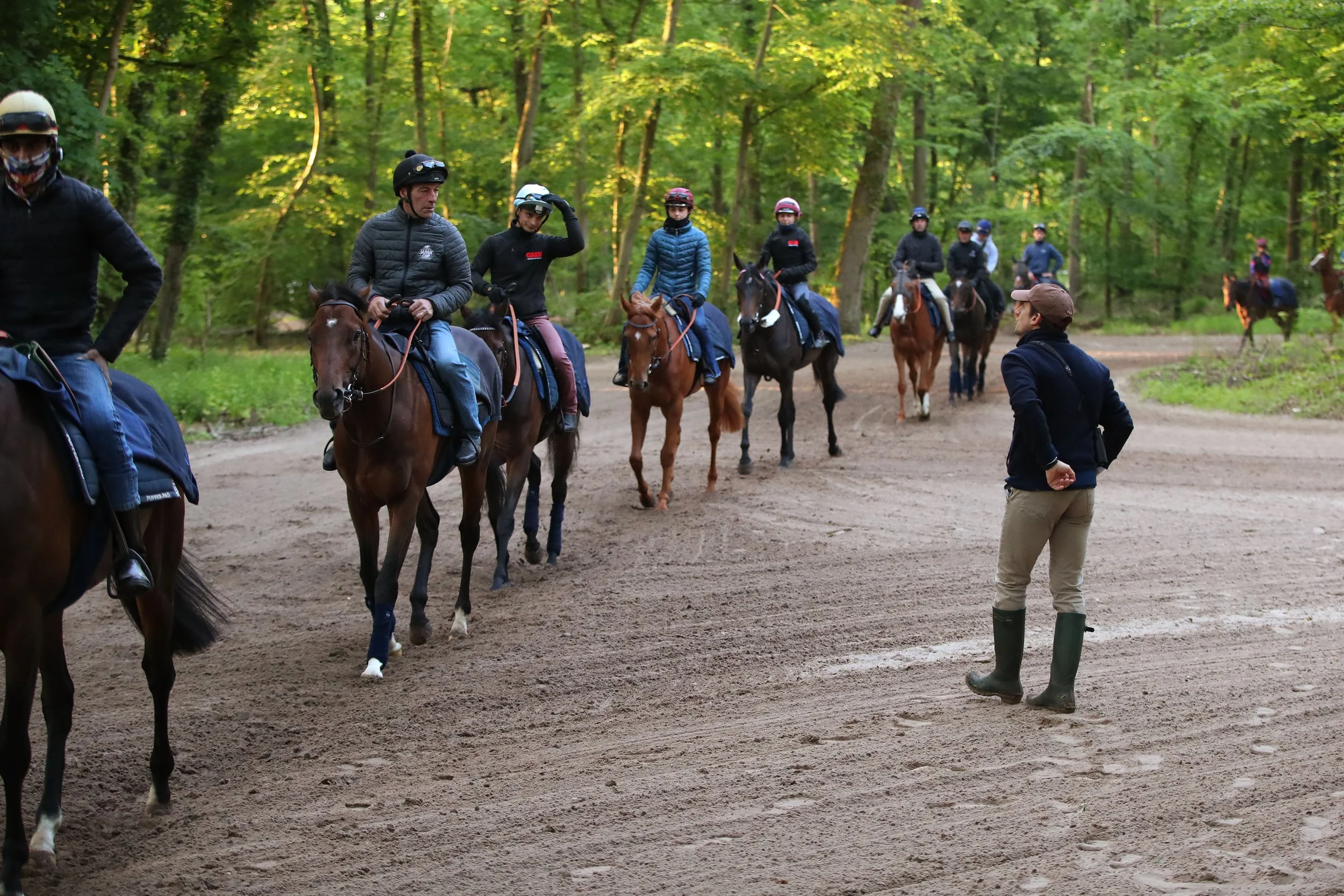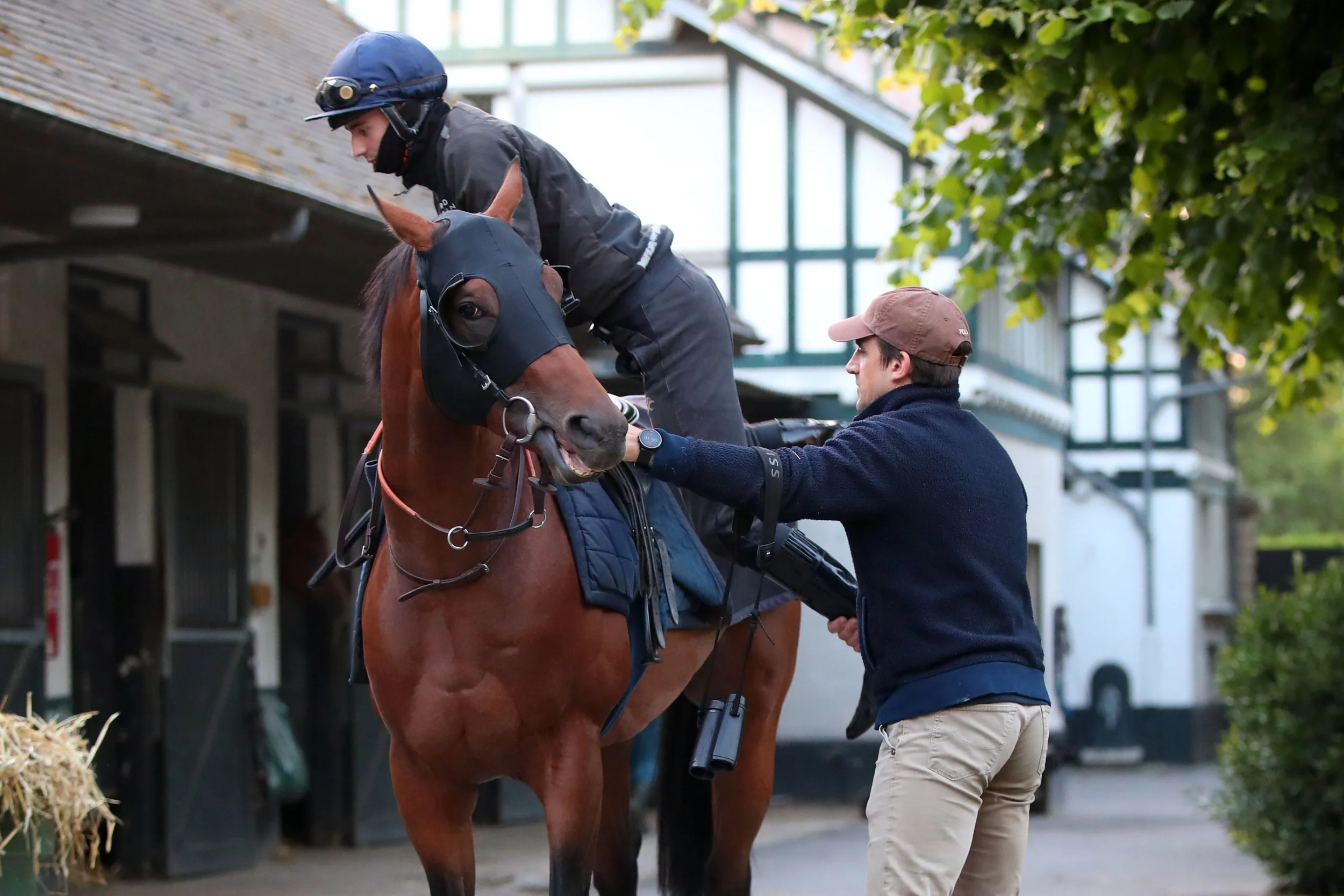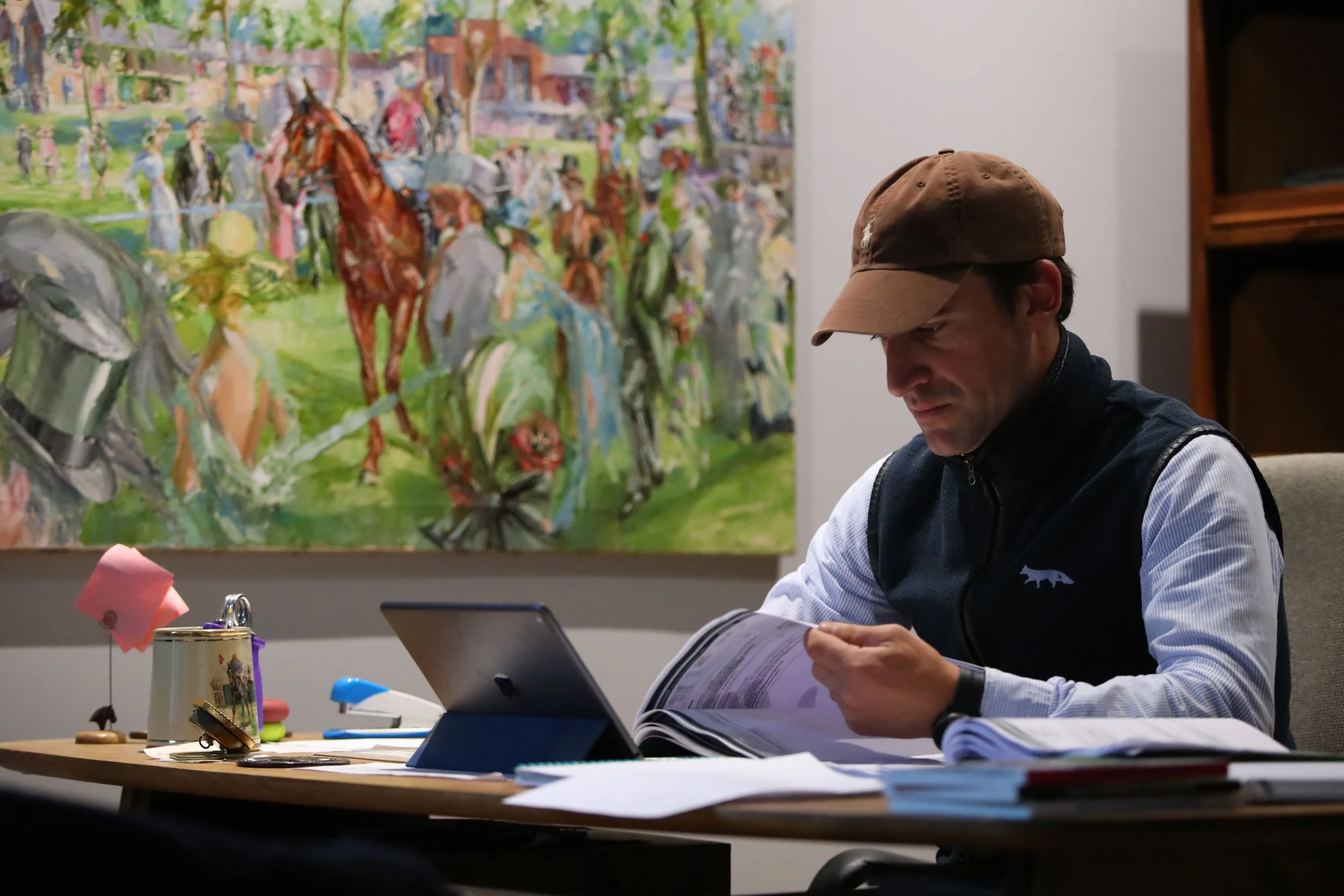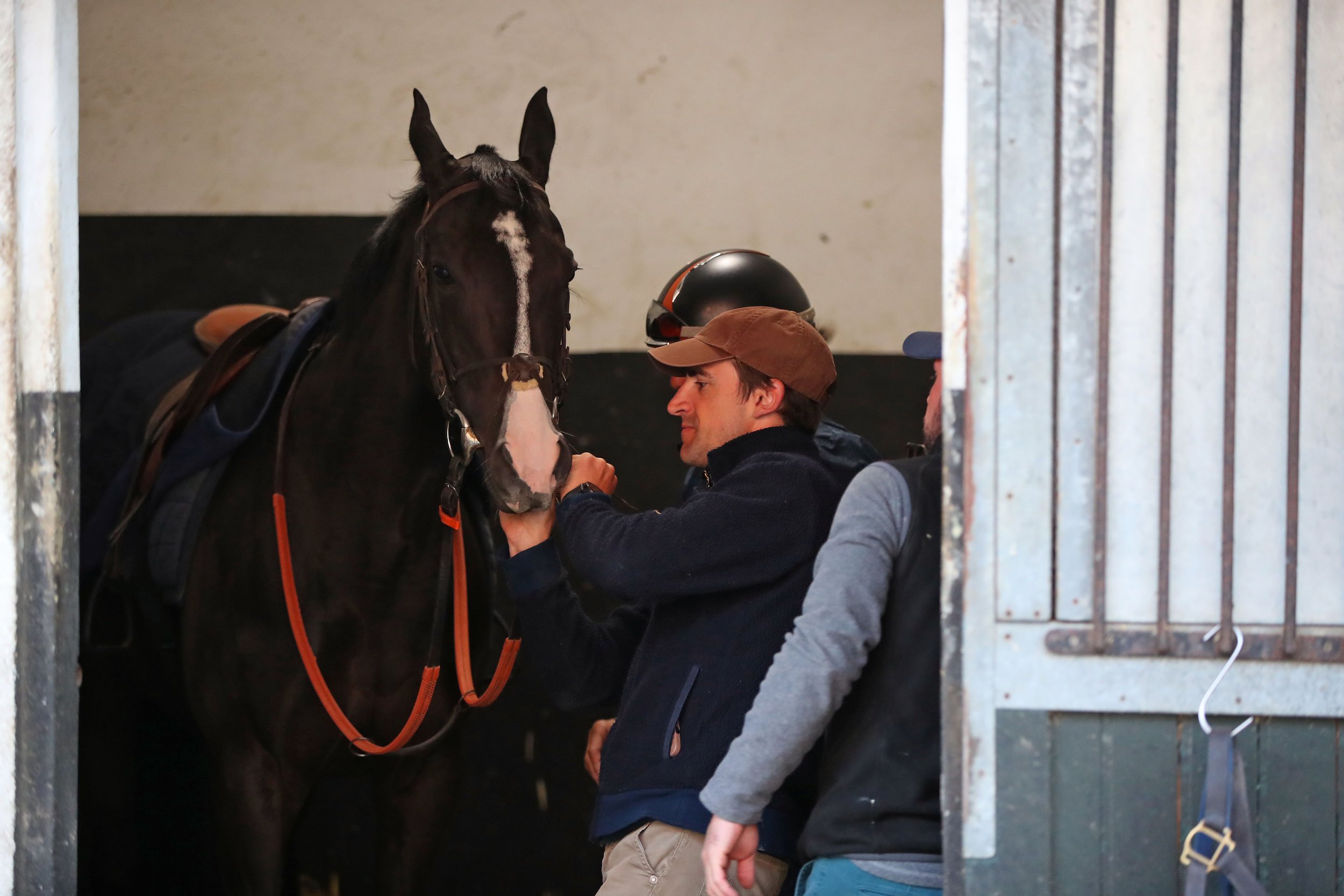Mario Baratti - how he’s created a classic winning stable in the heart of Chantilly
Mario Baratti is sitting behind the desk in the spacious office of his stable off the main avenue leading into Chantilly, munching a croissant in between second and third lots. I decline his offer of breakfast, and we quickly agree to communicate in French and to use the friendly “tu” form instead of the more formal “vous”.
Above the trainer’s right shoulder, a large watercolour depicts a scene of Royal Ascot, “it was a wedding gift and it was too big for the house so it has a perfect place here… The colours are beautiful and it’s a wonderful source of inspiration!” The walls are also adorned with photos and a framed front page of French racing daily Paris-Turf showing Baratti’s two Classic winners to date, Angers who lifted the German 2000 Guineas at Cologne in 2023 and Metropolitan who propelled his handler onto the big stage with a first Group 1 victory in the Poule d’Essai des Poulains a year later. There is plenty of space left for memorabilia which seems sure to come to celebrate wins in the future.
Born and raised in Brescia in North-West Italy near Lake Garda, Mario Baratti has a slightly different profile from several of his compatriots who are now successfully operating in Britain and France. The 35-year-old does not hail from a big racing family and he has little experience of training in his native country.
He explains, “My father was a great sportsman and was good at a lot of sports. Between age 18 and 25 he rode over jumps as an amateur. I started riding very early, at age four or five, and showjumped and evented when I was young and then started riding as an amateur as soon as I could. I was a true amateur as I didn’t start working in racing until I was 19. I was lucky to ride about 70 winners, in Italy but also in Britain and France, in a relatively short career in the saddle.”
A couple of summer stints with John Hills in Lambourn as a teenager further fuelled the young Mario’s passion for racing and he soon joined Italy’s legendary trainer, Mil Borromeo in Pisa, “Mil Borromeo was a great trainer, very sensitive and with an amazing capacity to listen to his horses. His objective was to create champions and he succeeded many times during his career. He was on the same level as the top trainers from England, Ireland and France from the time. He was very sensitive and attentive to his horses. My official title with him was assistant but I was so young I was more of an intern.”
After a year with the Classic Italian trainer, Borromeo advised the young Barrati to spread his wings and continue his education, both in racing and academically.
The Botti Academy
The logical port of call was Newmarket and the stable of training’s rising Italian star of the time, Marco Botti. “I used to ride out in the mornings and go to Cambridge in the afternoons to learn English. The original plan was to spend just a year in England to pass a language exam, but after I passed the exam, Marco Botti proposed the position of assistant if I stayed with him. When I started he had less than 50 horses and during the four years I was there the number rose to over a hundred so it was a real growth period. I had the good fortune to ride horses like Excelebration who was exceptional, and to travel to Dubai, or Santa Anita for the Breeders’ Cup... He had six or seven real high-quality Group horses, who could travel and win abroad.
I learnt many things during my time with Marco and the most important was probably how to manage the horses in the best possible way to optimize their potential. I think the secret to his international success is that he travels his horses at the right moment. He understands when a horse is tough enough to go abroad, and he doesn’t take them too early in their careers.”
After four years in the buzzing racing town of Newmarket, it was time to continue the learning curve and despite an offer to join another compatriot, Luca Cumani, Baratti remembers, “everyone advised me to go to America or Ireland.” So the young Italian found himself in rural County Kilkenny. “Jim Bolger said he would only take me if I stayed for three years, but in the end I cut my time short. It was a very good experience and I learnt a lot about breaking in yearlings and working with youngsters. I learnt what I could in a short time as I was only there for three or four months, an intense experience of work and life. Mr Bolger is a real horseman, who is tough on his horses but always manages to produce champions. He can do things that others cannot allow themselves to do, because he breeds and owns a lot of the horses himself.”
Despite the prestige of his Classic-winning mentor, Baratti was unable to settle in Ireland. “I like the countryside, but I was isolated. I was 25 years old and never saw or spoke to anyone and the lifestyle wasn’t for me. So one day I told him, “I can’t stay three years”, and he said, “you want to train in London? You can’t train in London!” I’ll never forget that! But he understood and in the end he said, “I’ve taught a lot of top professionals, McCoy, O’Brien, but it’s up to you if you want to leave. I hope that you find someone as good as me…””
Pascal Bary an inspiring mentor
Next stop was France, and Baratti took advantage of a couple of months before his start date with his next boss, Pascal Bary, to join fellow Italian Simone Brogi who had recently set out training in Pau. He also spent a month with Brogi’s former boss, Jean-Claude Rouget, at Deauville’s all-important August meeting.
“The time helped me to learn French and integrate into the French ambiance, which wasn’t easy. I found it much tougher to settle in France than in Newmarket. As a foreigner I felt less well received. Even at Newmarket, I started as an assistant when I was 18 years old, with no experience, and it was tricky to manage a team of 25 or 30 staff. But when I started here it was even more difficult to handle the French staff. They would say to me ‘I’ve never done that in 30 years and I’m not going to start now…’ During the early days with Pascal Bary, I thought that France wasn’t going to be for me. Then it became a personal challenge and I decided to stick it out. Now, Pascal Bary is one of the closest friends I have here in Chantilly, but at the start he wasn’t an easy boss. It took two years, of the four that I was there, before we built up a real relationship. On my side, I was very respectful, and I saw him as someone who was very reserved, so we kept our distance. I was in awe of him and his career. He wasn’t interested in just winning races, he wanted to develop the best out of his horses. That’s why he had such a great career. 41 Group 1 wins in a 40-year career is a huge achievement. He won Dianes, Jockey-Clubs, Poules, Guineas, Breeders Cups, the Irish Derby… He’s the only French trainer to win the Dubai World Cup. He started off going to California for the Breeders’ Cup when he was very young. He would dare to step into the unknown, because at the time it was much more complicated to travel around the world.
I was lucky to be there at the time of Senga - who won the Prix de Diane and Study of Man won the Prix du Jockey-Club. So I worked with top horses, who were perfectly managed, and many of them were for owner-breeders. Very early in the season, when the grass gallops opened, he would immediately pick out the three or four standout horses and plan their programme. He could tell right away which ones had talent ‘this one will debut in the Prix des Marettes at Deauville… ‘ I remember that year the filly did exactly that and won; it was Senga and she went on to win the Diane.
When you spend time with someone at the end of their career, there is more to learn. Pascal Bary had a superb training method, and he had the success he did because he was very firm in his decisions. He’s not someone who changes his mind every day, and there aren’t many people like that nowadays. He was very sensitive to his horses and always sought to create champions. I try to keep in mind his method.”
Changing dimension
The string for third lot is now ready to pull out and we make our way through the yard which has been adapted to accommodate an expanding string.
“We recently acquired the next-door yard and we knocked through the walls of a stable to make a passageway between the two. I now have 73 boxes in these two yards, plus 15 at another site which has the benefit of turnout paddocks.”
Through a gate in the hedge at the back of the courtyard and we are straight onto the famed Aigles gallops as the sun starts to break through the clouds on what had begun as an overcast morning.
“It’s a magnificent site; we are so lucky to have such beautiful surroundings and for me to be able to access the gallops on foot.” As we make our way to the walking ring in the trees where the Baratti string circles before and after work each morning, the trainer tells me, “I still ride out every Sunday, bar only two or three weeks in the year. I think it’s important to exercise as many as we can on a Sunday and if I ride two, that’s a help to the staff and a real pleasure for me too.”
The string of around twenty juveniles, many still unraced, passes before the trainer who gives multilingual orders. “Here we speak Italian, French, English, Arabic and Czech,” he explains, “we try to all speak French but of course sometimes we communicate in Italian, especially when things get heated! We’ve more than doubled in size since last autumn and so we built up the new team throughout the winter and in spring. It’s all coming together now. For the first few years everything went very smoothly, but there were only half a dozen members on the team! When you get up to 25, it’s a different story.”
The team includes a couple of former Italian trainers who left their country and now work as managers for the burgeoning Baratti stable, plus veteran Filippo Grasso Caprioli, Mario’s uncle who was a leading amateur rider in Italy in his time. “He “just” rides out, he doesn’t have a position of responsibility but he does give us the benefit of his age and experience!”
Another vital member of the team is Monika, Mario’s Czech-born wife. “We first met at the Breeders’ Cup when I travelled with Planteur and she was the work rider of Romantica for André Fabre. When I first moved to France we both lived in the same village, 100m away from each other but we never bumped into each other. We met again four years after I moved to France. We’ve been together now for seven years and married this spring. Monika is an excellent rider and she also takes care of the accounts, but her most difficult job is taking care of our two small boys. I think she sometimes comes into the yard for a break!”
As we trudge across the damp turf to the Réservoirs training track, Baratti expands on his choice of Chantilly. “When I was in Newmarket I thought I would never leave, but then it was logical to continue here after I had done my time with Pascal Bary. And of course, the French system is very beneficial compared to elsewhere in Europe. The facilities here in Chantilly are second to none. When I first started I used to use all of the gallops but now I have my routine and regularly use Les Réservoirs. I often use the woodchip but there is plenty of choice. Once you have understood how each track works then it’s simple.”
The first group of two-year-olds canter past, and Mario runs through some of the sires represented: Siyouni, Lope de Vega, Wootton Bassett, for owners such as Nurlan Bizakov, Al Shir’aa, Al Shaqab and powerful French operators such as Laurent Dassault, Bernard Weill and others.
“This is the first year that I’ve had such a good panel of owners, and a better quality of horses. It is certainly thanks to Metropolitan and the successful season we had last year. In previous years, we did well with limited material, and we managed to win Listed or Group 3 races which isn’t easy when you only have 20 horses. This year we have more horses but haven’t won any big races yet (he laughs nervously) but they will come…”
Indeed days after the interview, the stable enjoyed a prestigious Group success on Prix du Jockey-Club day with the Gérard Augustin-Normand homebred Monteille, a sprinting filly who was trained last year by the now-retired Pascal Bary.
“It's very important to have owners who also have a breeding operation. They have a different outlook on racing and they are often the ones that produce the really top horses. They expect good results, of course, but they understand the disappointments and are generally more patient. The other owners are important too, and Metropolitan, who we bought at the sales, is the proof of that.”
Classic memories
Understandably, a smile widens across Mario’s face as he remembers the day when the son of Zarak lifted the Poule d’Essai des Poulains to offer the trainer his first major Classic winner.
“I was only in my fourth year of training, it wasn’t even in my dreams to win a Poule so soon in my career. It’s hard to describe, the joy was enormous. The fact that we ran in the race again this year, with a very good horse (Misunderstood) but everything went wrong, makes you realise now how difficult it is for everything to go right on a day like that. I always thought that Metropolitan was an exceptional horse. We were far from favourites in the Poule but I knew we had a good chance of winning. The owners rang me on the morning of the race and asked, ‘Mario do you think we can win?’ and I said Yes! He had finished fifth in the Prix de Fontainebleau and we had ridden him to avoid a hard race, but still, many observers overlooked him. Apart from in his last race on Champions Day, he never put a foot wrong. He confirmed his class when third in the St James’s Palace Stakes in a top-class field and then was beaten by the best four-year-old miler in Europe, Charyn, in the Jacques le Marois. And at the time, we only had three or four three-year-olds in the yard, so the percentage was amazing.”
Baratti had already tasted Classic glory a year earlier, thanks to Angers (Seabhac) who won the Group 2 Mehl-Mülhens-Rennen (German 2000 Guineas). A first successful international raid from the handler who learnt from some of the industry’s specialists.
“You travel if your horse is very, very good, or not quite good enough,” he explains.“If you travel to Royal Ascot, you have to be exceptional, the same for the Breeders’ Cup. But for Germany you can take a decent horse who isn’t quite good enough for the equivalent races here. Angers had finished second in the Prix Machado which is a trial for the Poule d’Essai. I already had Germany in mind for him if he was placed in the Machado, and he went on to win well in Cologne. Every victory is very important, the key is to aim for the right race within the horses’ capabilities. Each horse has his own “classic” to win, with a made-to-measure programme.”
Many expatriate Italian trainers target Group entries in their native country, but Baratti is not keen to explore this option. “I have never had a runner in Italy. I did make an entry recently but we ended up going elsewhere. Italian black-type is very weak for breeding purposes, so it’s not really worthwhile for me to race there. There are a lot of good professionals in Italy but I don’t really have much connection with them because I’ve never worked over there, I left when I was young.”
A realistic approach
Baratti’s adopted homeland of France has recently announced austerity measures for the forthcoming seasons to compensate for falling PMU turnover and pending the results of a recovery plan which aims to increase the attractivity of French racing for owners and public. France Galop prize money will be reduced by 6.9%, equating to 10.5 million euros during the second half of 2025 and 20.3 million euros for following seasons until a hoped-for return to balance in 2029.
“It’s normal,” says the Italian pragmatically. “It’s better that they make a small reduction now than wait two or three years and have to make drastic cuts. It’s necessary to take the bull by the horns, not like how it was in Italy when they let the situation decline and then it became too hard and too late to redress. We are fortunate to be in a country where prize money is very good compared with our neighbour countries in Europe, so a small reduction won’t affect people too much.
Owning racehorses is a privilege and a passion. It is a luxury and people should treat it as such, not buy horses as a means to earn money. If you buy a magnificent yacht, it costs a fortune, and it’s pure outlay. Money spent on having fun. Nowadays, a lot of people invest in racehorses for business purposes, but they need to have the necessary means. If you are lucky to buy a horse like Metropolitan and then sell him for a lot of money, that’s another story, but it wasn’t the aim at the outset.”
He remembers an important lesson on owner expectations from former mentor Pascal Bary. “I was surprised once when Mr Bary received some foreign owners in his office. They wanted to buy ten horses. He told them, the trainer earns money, not every day, but he tries, in any case his objective is to earn money, the staff earn money and the jockey earns money. Normally, the owner loses money. If things go well, they don’t lose much, if they go very well they can break even, and when it’s a dream, then you can make money, but that’s the exception to the rule. The guys had quite a lot of money to invest and they were there, open-mouthed. In the end they chose another trainer. But Mr Bary was right. If I decide to buy a horse tomorrow for 5,000€, I have to consider that 5,000€ as lost. If I want to invest, I should buy a house.
His explanation was very clear and that’s how racing should be understood. It would be nice to have a group of friends buy a horse, but it costs a lot. Ideally it should just be for pleasure, like membership at the golf, or tennis. It's an expenditure. And if in the end you end up winning, then all the better. And it can happen. Bloodstock agents do that for a living but it’s their profession. My owners are in racing for the pleasure.”
With an upwardly-mobile, internationally-minded and ambitious young trainer, Baratti’s owners certainly look set for a pleasurable ride over the forthcoming seasons, and the office walls are unlikely to remain white for long.
Trainer of the Quarter - Pascal Bary
Click on the image to read --

